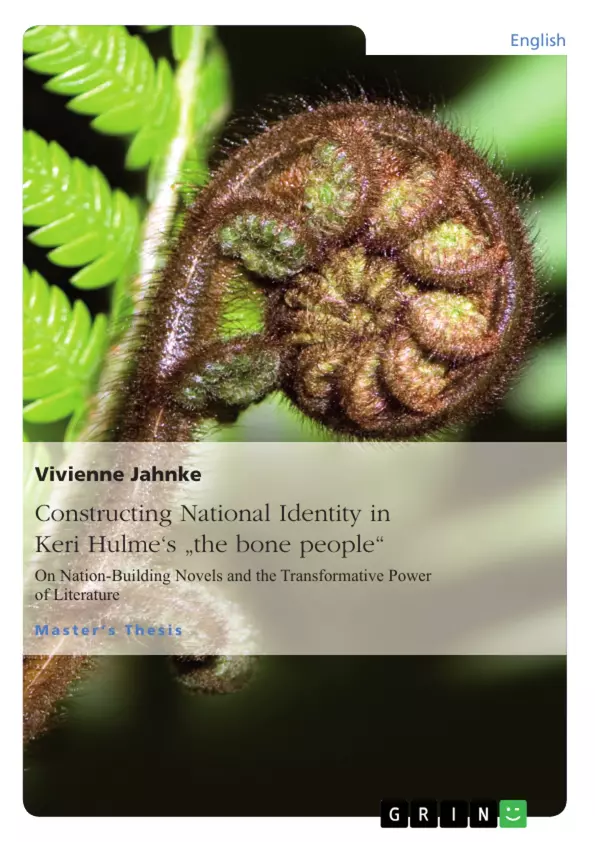This thesis analyses New Zealand writer Keri Hulme's novel "the bone people" and argues that she speaks to the core of her country’s postcolonial identity crisis – and in doing so compels her fellow New Zealanders to confront the social reality in their country and to enter into the discourse of who they want to be as a nation. Accordingly, this thesis is going to analyse Hulme’s writing strategies from a postcolonial viewpoint, exploring matters of identity construction on an individual as well as on a national level. Does her novel succeed as literature partaking in the nation-building process?
A brief excursion into the realm of theory will provide the necessary framework for the analysis. After the in-depth discussion of "the bone people", a comparative approach in the form of a closer look at some contemporary New Zealand writers’ dealing with New Zealand’s postcolonial condition will provide additional depth. Works from some of New Zealand’s most renowned authors, Witi Ihimaera, Patricia Grace, Alan Duff and Eleanor Catton will be compared to "the bone people".
Finally, a conclusion shall be drawn as to exactly how far New Zealand has come in its development as a country of bi- or even multiculturalism since the publication of "the bone people". It shall be discussed whether or not the novel's vision is one still relevant to New Zealand national identity today, whether the momentum the Maori gained in their agenda to revitalise their culture, out of which Hulme’s novel has sprung, had more than just a ceremonial effect on the country and consequently how Hulme’s vision is holding up to the reality of New Zealand in the twenty-first century.
Table of Contents
- I. Introduction
- II. Expressing Concepts of Identity and National Identity in Postcolonial Discourse
- III. Construction of National Identity in the bone people
- a. Creating Controversy
- b. Deconstructing New Zealand
- c. Constructing Aotearoa
- IV. Thirty Years Later – Placement within the New Zealand Literary Canon
- a. the bone people and Witi Ihimaera's Whanau and Whanau II
- b. the bone people and Patricia Grace's Potiki
- c. the bone people and Alan Duff's Once Were Warriors
- d. the bone people and Eleanor Catton's The Luminaries
- V. Conclusion
Objectives and Key Themes
This work examines the construction of national identity in New Zealand through the lens of Keri Hulme's novel "the bone people." The author explores how Hulme's work engages with the postcolonial context of New Zealand, particularly the relationship between Maori and Pakeha cultures.
- Postcolonial Identity in New Zealand
- The Construction of National Identity
- Maori and Pakeha Cultural Interactions
- Biculturalism and the Role of Maori Spirituality
- The Treaty of Waitangi and its Impact
Chapter Summaries
The introduction provides context for Hulme's novel, highlighting her achievement of winning the Man Booker Prize and her aim to create a New Zealand myth that harmonizes Maori and Pakeha influences. It discusses the historical background of New Zealand, emphasizing the impact of colonialism and the Treaty of Waitangi on Maori culture. The chapter concludes by exploring the shift towards biculturalism and the rise of the Maori Renaissance in the 1980s.
Chapter II delves into the concept of identity and national identity in postcolonial discourse, exploring the role of literature in shaping national narratives. It discusses how indigenous writers use their works to challenge dominant discourses and contribute to nation-building.
Chapter III focuses on the construction of national identity in "the bone people," analyzing how Hulme presents her vision of a New Zealand society that embraces both Maori and Pakeha cultures. The chapter examines the novel's key themes, including biculturalism, Maori spirituality, and the relationship between the land and its inhabitants.
Chapter IV explores the placement of "the bone people" within the New Zealand literary canon, comparing it to other significant works by authors like Witi Ihimaera, Patricia Grace, Alan Duff, and Eleanor Catton. The chapter examines the novel's influence and its contribution to the evolving national identity discourse.
Keywords
Key terms and concepts explored in this work include postcolonialism, national identity, biculturalism, Maori culture, Pakeha culture, the Treaty of Waitangi, Maori Renaissance, "the bone people," and New Zealand literature.
- Arbeit zitieren
- Vivienne Jahnke (Autor:in), 2015, Constructing National Identity in Keri Hulme's "the bone people", München, GRIN Verlag, https://www.grin.com/document/317242



